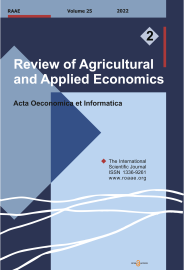KEYWORDS:
food safety; perishable food sector; non-perishable food sector; external constraint; internal constraint
DOI NUMBER:
10.15414/raae.2021.24.01.27-36
ABSTRACT:
Research background: The motive behind intentional non-microbiological contamination or adulteration of foods is to limit costs, enhance competitiveness, and increase profits. Profits motivate entrepreneurs and costs caused by operating a quality assurance program that is not offset by revenue increases are resisted.Purpose of the article: To understand the constraints preventing companies from having quality assurance programs, this study examines differences in importance of various constraints in three food industry sub-sectors in Shanghai, China.
Methods: The study applies the own survey data because there is a lack of readily available data on the selected topic. A total of 199 food company representatives completed a questionnaire during a workshop on food regulations between September and December, 2016. Descriptive statistics and the heteroskedasticity corrected regression technique are applied to identify statistically significant factors.
Findings & Value added: Results show that perishable food sub-sector companies more often agreed that constraints were important in limiting quality assurance programs as compared to the non-perishable food sub-sector. A company anticipating a decrease in revenues in the three years following the survey (2017-2019), employing seasonal workers, and represented by a middle level manager was more likely to view constraints as barriers. Although Shanghai is a large commercially area, the study does not include companies from other provinces recognizing that some regional specificity may matter in implementing quality assurance program. The identified factors suggest the role for government agencies in facilitating such implementation by offsetting selected costs associated with the process of adopting a quality assurance program, while the society at large learns about factors motivating or hampering the implementation of quality assurance programs by food manufacturing companies. This study fills the void in the literature and provides insights about the constraints faced a company generating knowledge for regional and national regulators useful in choosing subsectors and specific aspects facilitating food quality program implementation.
Please Cite this Article as:
Qijun JIANG, Wojciech Jan FLORKOWSKI (2020) Factors Limiting Quality Assurance Program Implementation In Food Manufacturing Companies In Shanghai, China. Review of Agricultural and Applied Economics. XXIV (Number 1, 2020): 27-36. doi: 10.15414/raae.2021.24.01.27-36
URL for sharing:
https://roaae.org/1336-9261/doi/abs/10.15414/raae.2021.24.01.27-36
FULL TEXT PDF:
▼ direct download link| view online in fullscreen ▲
References:
▼ direct download link

